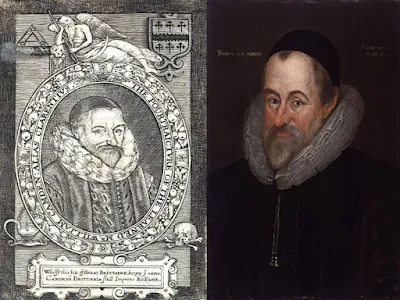William Camden (2 May 1551 – 9 November 1623) Elizabethan Historian & Scholar
'The early bird catches the worm' William Camden
Today marks the 389th anniversary of the death of William Camden,
antiquarian, Elizabethan scholar, and the author of Britannia, the
first topographical survey of the British Isles. His Annales Rerum Gestarum
Angliae et Hiberniae Regnate has the distinction of being the first, though certainly not the last, biography of
Elizabeth I, an undertaking suggested, apparently, by Lord Burghley. He also
wrote the official account of the Gunpowder Plot and taught Ben Jonson while
headmaster of Westminster School.
Being a great admirer of Elizabeth Tudor, I want to focus mainly on William Camden's first historical biography of Queen Bess.
The high cultural memory of Elizabeth was kept alive in the writings of historians, preachers, and politicians. The greatest of these was undoubtedly William Camden, learned London schoolmaster, friend of Sir Robert Cotton, co-founder of the Society of Antiquaries, and correspondent with some of the brightest minds of Europe. As early as 1596, Camden's 'old patron Lord Burghley suggested to him that he write the history of the reign of Queen Elizabeth,' and provided him with access to the state papers. When Burghley died two years later, Camden hoped that someone else would take on what he obviously felt was a daunting task. But no one came forward, and then around 1605 he suddenly dropped everything and began to work intensely on the history. This time it was under pressure from King James, who wanted to counter the effects of George Buchanan's History of Scotland that was making its rounds on the Continent, denigrating James's mother, Mary Queen of Scots. James wanted Camden to provide a more positive account of that part of Elizabeth's reign to show to the noted French historian, Jacques-Auguste de Thou, who was writing his great history of the period, but when James found his influence did not work with Thou, he commanded Camden to go ahead and publish his own history, even though it only went up to 1588. Thus in 1615 appeared Camden's Annales rerum Anglicarum, et Hibernicarum, regnante Elizabetha. Camden went on to finish the work, but James was no longer interested in having the rest printed. In order to secure its ultimate appearance, Camden sent the manuscript to his friend Pierre Dupuy, who published it in 1625 in Leiden, after the deaths of both Camden and James. In the same year, an English translation of the earlier part of the 'Annales' was published in London. A translation of all four books appeared in 1626, and again 1630 and 1635.
William Camden was really the first great modern English historian. He was writing a new kind of history, based not on 'the humanist, merely literary tradition, with its fictitious rhetoric and moral examples, ' nor on 'the ecclesiastical tradition, which embedded history in revelation and prophecy' the story of the world from Noah to the present. Instead, Camden adopted the new secular history espoused by Jean Bodin, who saw history as 'the study of political conditions and the explanation of human revolutions.' Camden says in his introduction that he included ecclesiastical as well as matters of policy and war, for the three cannot really be separated. He also reported speeches as they came to him and did not make them up, as some historians were used to do. Above all, he insists that he has tried to keep a fair mind. Today we recognize that everyone writes from some point of view, but nevertheless it was admirable in Camden to sift out 'the judgement of others,' rather than too often inserting his own. Camden's last words on Elizabeth were prophetic,
'No oblivion shall smother her glory, for her most happy memory liveth, and so shall live in all mens minds to all posterity.'
I would be remiss without mentioning William Camden’s Britannia.
Printed in 1586, it staggered its Elizabethan readers. Nothing like it had been
seen before. For the first time, the entire British Isles had been described in
astonishing detail: the mountains and rivers, the history and customs, the
climate and the people of each and every county. Britannia was an encyclopaedic
survey of the whole country in a single book.
'For
the air is most temperate and wholesome, situated in the midst of the temperate
zone. For water, it is walled and guarded with the Ocean, most commodious for
traffic to all parts of the world. The earth fertile with all kinds of grain,
manured with good husbandry, rich in mineral of coals, tin, lead, copper, not
without gold and silver, abundant with pasture, replenished with cattle both
tame and wild, plentifully wooded, beautified with many populous cities, fair
boroughs, good towns, and well-built villages.'
SOURCES
Queen Elizabeth's First Historian (London: Jonathan Cape, 1971)
Camden, Annales (London, 1630)
Please feel free to leave comments,



Comments